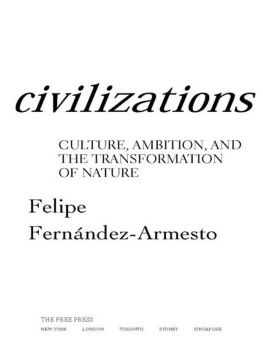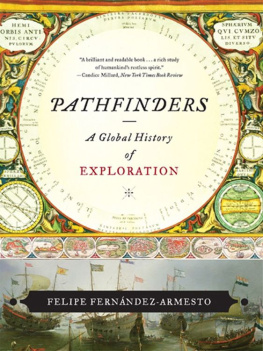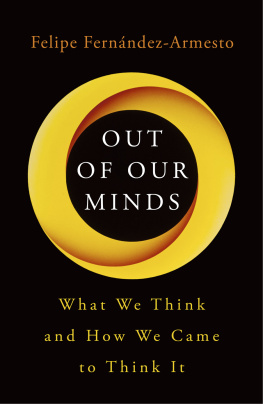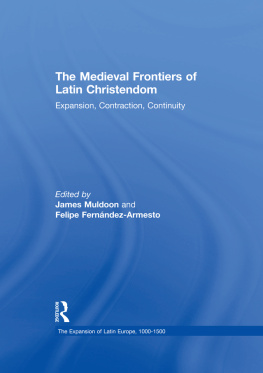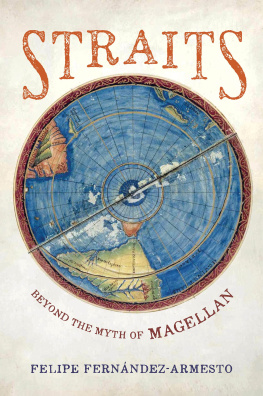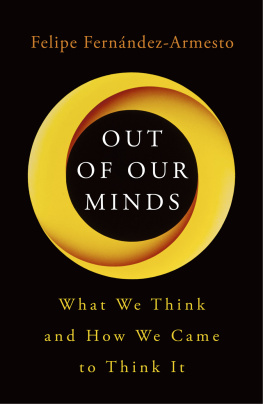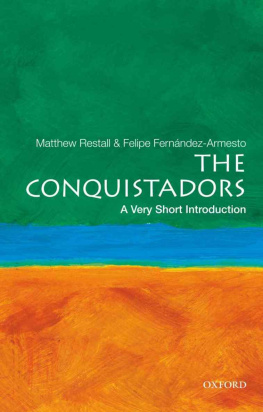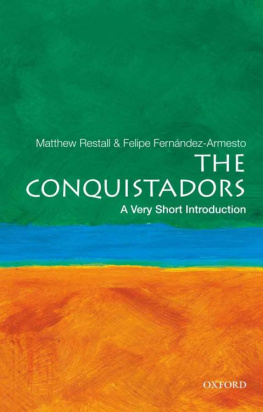
THE FREE PRESS
A Division of Simon & Schuster, Inc.
1230 Avenue of the Americas
New York, NY 10020
Copyright 2001 by Felipe Fernandez-Armesto
All rights reserved, including the right of reproduction in whole or in part in any form.
Visit us on the World Wide Web:
http://www.SimonSays.com
THE FREE PRESS and colophon are trademarks of Simon & Schuster, Inc.
ISBN 0-7432-1650-4
Japan Revived (1953) by Edmund Blunden is taken from A Hong Kong House: Poems 19511961 (copyright Edmund Blunden 1962). Reproduced by permission of PFD on behalf of the Estate of Edmund Blunden.
Extract from the song Mad Dogs and Englishmen by Noel Coward reproduced by permission of Methuen Publishing Ltd, London.
Extract from Collected Poems, 19091962 by T. S. Eliot reproduced by permission of Faber and Faber Ltd, London.
Quotations from publications of The Hakluyt Society reproduced by kind permission of the Council of The Hakluyt Society.
Contents
PART ONE: THE WASTE LAND
Desert, Tundra, Ice
PART TWO: LEAVES OF GRASS
Barely Cultivable Grasslands
PART THREE: UNDER THE RAIN
Civilization in Tropical Lowlands and Postglacial Forests
PART FOUR : THE SHINING FIELDS OF MUD
Alluvial Soils in Drying Climates
PART FIVE : THE MIRRORS OF SKY
Civilizing Highlands
PART SIX : THE WATER MARGINS
Civilizations Shaped by the Sea
PART SEVEN : BREAKING THE WAVES
The Domestication of the Oceans
Many the wonders but nothing walks stranger than man.
The thing crosses the sea in the winters storm,
Making his path through the roaring waves,
And she, the greatest of gods, the Earth
Ageless she is and unweariedhe wears her away
As the ploughs go up and down from year to year
And his mules turn up the soil.
Gay nations of birds he snares and leads,
Wild beast tribes and the salty brood of the sea
With the twisted mesh of his nets, this clever man.
He controls with his craft the beasts of the open air,
Walkers on hills. The horse with his shaggy mane
He holds and harnesses, yoked about the neck.
And the strong bull of the mountain.
Language, and thought like the wind
And the feelings that make the town
He has taught himself, and shelter against the cold,
Refuge from rain. He can always help himself.
He faces no future helpless.
Theres only death
That he cannot find an escape from.
Sophocles, Antigone 332369,
translated by Elizabeth Wyckoff (Chicago, 1959 )
O ruines! je retournerai vers vous prendre vos lecons!
C. F. V olney , Les Ruine ( 1791 ), in
Oeuvres , vol. (Paris, 1989 ), p. .
Preface
Really, it was just a small, spare library cubicle, but, in my imagination, I was in Amalias room. The wallpaper was heavily flocked with velvet, the windows hung with double sets of curtains. More drapes enclosed the bed. Whereas most people in mid-nineteenth-century Argentina lived in houses with earthen floors, Amalias Italian carpet was so thick that your foot felt cushioned. The air was heavily scented. On every side, light was excluded, weather shut out, nature rejected, except in the pale-golden design raised on the surface of the wallpaper, which represented the play of light between faint clouds.
Because of the critical interest it excites, Amalias must be one of the most frequented rooms in fiction, though the woman who lived in it was chaste. It is an easy room to imagine, because Jorge Marmol described it exactly in his great novel of 1851 : the book which is usually said to have started Argentinas distinguished tradition as a land of novelists. I was reading it this morning, before I started writing for the day.
Like all the citizens of Buenos Aires in her day, Amalia had something to prove. It was a frontier capital, when Argentina was an estuary and the pampa a palatinate. Everything in the environment was daunting, every view limitlessso vast as to be practically indistinguishable from the blur of blindness and numbness, along the sea-wide river, across the ocean-wide sea, into the apparently endless plain. A ride away lived the people the citizens called savages. Here, to be convincing, civilization had to be exaggerated.
Not all people who aim to be civilized cocoon themselves so deeply, shutter-their rooms so thoroughly, and separate nature so decisively from their dwelling space: civilization is, however, a product of what I now like to think of as the Amalia Effect. Civilization makes its own habitat. It is civilized in direct proportion to its distance, its difference from the unmodified natural environment. What provokes the Amalia Effect? Not an instinct, because some individuals, some entire societies, are without itbut an impulse or irritant which is almost universal and which, as I argue below, no habitable environment can altogether resist.
History is a humane pursuit, rather than a scientific one, in the conventional sense, because the past is not present to our senses: we can only know other peoples impressions and perceptions of it. Yet people are part of the awesome continuum of nature, and you cannot encounter them except in the tangle of their environments and the mesh of the ecosystems of which they form part. This book is a story of nature, including man. Unlike previous attempts to write the comparative history of civilizations, it is arranged environment by environment, rather than period by period or society by society. This shows where my priority lies. My purpose is to change the way we think about civilization: to present it as a relationship between one species and the rest of nature, an environment refashioned to suit human usesnot a phase of social development, or a process of collective self-improvement, or the climax of a progressive story, or just a suitable name for culture on a large scale, nor a synonym for excellence endorsed by elites. I am not trying to impose a new definition on an old word. On the contrary, I am reformulating a traditional usage. Whenever the word civilization is properly used, it suggests a type of environment; but this meaning has got buried under the rubble of misuse and needs to be excavated.
No way of dividing up the world by environments is entirely satisfactory. Geographers like to picture them unmodified by man and sort them into natural ecosystems. Most such attempts end up by identifying between thirty and forty main classes. But man is part of nature. He has dominated most ecosystems of which he has formed part. In this book, I have tried out a scheme based on environmental features which are closely reflected in peoples actual experience of life in civilizations. However comprehensive one tries to make ones scheme of classification, every environment will enclose a variety of habitats and niches. The categories crisscross and overlap. There are deserts with rainfall as high as in many forests. There are alluvial floodplains in almost every latitude.

